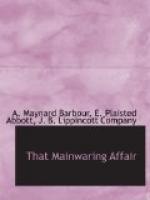“You had forgotten the interview with Walter LaGrange, I presume.”
Brown made no answer.
“Why did you not mention that?”
“I wasn’t asked to,” he replied in insolent tones; “you said nothing to me about Mr. LaGrange.”
“You are expected to state in full every occurrence having any bearing on the situation. You may give the particulars of that interview now.”
“There’s nothing to tell more than Uncle Mose told. I was working in the stables as usual, and Mr. LaGrange came in in a big hurry and ordered me to saddle his horse as quick as I could, that Mr. Mainwaring had been murdered, and he’d got to go to town.”
“At what time was this?”
“About half-past seven, I should say.”
“Did he state his errand?”
“No, sir.”
“When did he return?”
“I saw his horse standing in the yard outside the stables about half an hour after, and then ’twas gone, and I didn’t see it again till noon.”
Walter LaGrange was next called. He stated that he had spent the greater part of the day preceding the murder away from Fair Oaks; he had not been at home to luncheon or dinner, and consequently knew nothing of the strangers seen on the place that day. He had returned about half-past ten that evening, and remembered seeing Mr. Mainwaring and his guests seated on the veranda, but he had gone directly to his room without meeting any one. The first intimation which he had received of any unusual occurrence the next morning was when his mother entered his room and told him that Mr. Mainwaring had either been murdered or had committed suicide, no one knew which.
“Was that her only object in coming to your room?”
“No, sir; she wanted me to do an errand for her.”
“Will you state the nature of this errand?”
“It was only to deliver a note.”
“To whom?”
“To Mr. Hobson,” the young man answered weakly, while his mother frowned, the first sign of emotion of any kind which she had betrayed that day.
“Did you deliver the note?”
“Yes, sir.”
“Then, under your mother’s orders, you went to the city on your second trip, did you not?”
“Y-yes, sir.”
“Were you successful in finding Mr. Hobson there?”
“Yes, sir,” the witness answered sullenly.
“You had other business in the city aside from meeting him, had you not?”
Between the coroner’s persistence and his mother’s visible signs of displeasure, Walter LaGrange was fast losing his temper.
“If you know so much about this business, I don’t see the use of your questioning me,” he retorted angrily. “It’s no affair of mine anyway; I had nothing to do with it, nor I won’t be mixed up in it; and if you want any information you’d better ask mother for it; it’s her business and none of mine.”
After a few more questions, which the witness answered sullenly and in monosyllables, he was dismissed.




